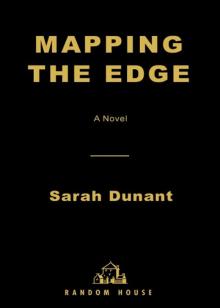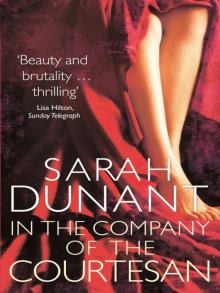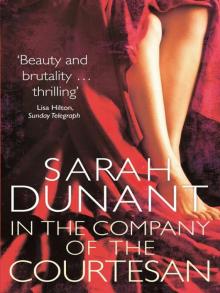- Home
- Sarah Dunant
Birth Marks
Birth Marks Read online
Books by Sarah Dunant
The Hannah Wolfe Novels
Under My Skin
Fatlands
and
The Birth of Venus
Mapping the Edge
Transgressions
Snow Storms in a Hot Climate
SCRIBNER
1230 Avenue of the Americas
New York, NY 10020
This book is a work of fiction. Names, characters, places, and incidents either are products of the author’s imagination or are used fictitiously. Any resemblance to actual events or locales or persons, living or dead, is entirely coincidental.
Copyright ©1992 by Sarah Dunant
All rights reserved, including the right of reproduction in whole or in part in any form.
SCRIBNER and design are trademarks of Macmillan Library Reference USA, Inc., used under license by Simon & Schuster, the publisher of this work.
Library of Congress Control Number: 92-14735
ISBN 0-7432-7187-4
Visit us on the World Wide Web:
http://www.SimonSays.com
To Ian and Zoe
BIRTH MARKS
CHAPTER ONE
Mistake number one: I should never have sublet the flat. Mistake number two was letting myself be taken in by appearances. With a job like mine you’d think I would have learnt by now. But she had seemed such a shrinking violet, an anthropology student with so many religious books that she was clearly having trouble with Darwin. Obviously somewhere over the last three months the evolutionists had struck back. The kitchen smelt as if a dinosaur had died there and the bed looked as though it had been used to test out the survival of the fittest theory. Sex and drugs and rock ’n’ roll. It had all happened here. And I hadn’t had any of them. Ah, these young people. As a woman on the wrong side of thirty I could feel disapproval coming on.
Still, some things were better than others. London looked positively rural after Hong Kong and I would never again have to stand in line while Mrs Adeline Van de Bilt signed another traveller’s cheque. God knows why she had employed me in the first place. For a woman in need of security she had enough twenty-one-carat knuckle dusters to lay out most would-be attackers. And what the stones didn’t incapacitate the tongue would mop up. Rich women. Maybe they’ve just never had to ask for anything, so no one ever taught them how to say please. Or thank you. My fault entirely. We never did sort out the small print of extra hours. ‘You have to be more business-like, Hannah,’ as my father would say when I tried to sell him Mediterranean after I had landed on Boardwalk with two hotels. Come to think of it, Mrs Van de Bilt probably owned the freehold.
Still, no good whingeing. There were things to be done, people to see, bills to be paid. The cleaning firm estimated it would cost a hundred and thirty quid to steam clean the carpets and degrease the kitchen, and with no forwarding address for Margaret Mead the name on the door was the name on the cheque. Work—that was what was needed. Except that’s the trouble with service industries. If no one needs the service the industry doesn’t work. Like now. The post yielded mild threats from credit-card firms and a billet-doux from British Gas, while the telephone messages that Miss Evolution had managed not to lose were all specific. If I wasn’t there they would find someone else. Of course it wasn’t the end of the world. There was always Frank. But once you leave a firm it’s humiliating to have to go back begging for work. And I had got picky in my old age. I was no longer willing to wheel myself round supermarkets busting women who needed the goods more than the store needed the money. No, Frank.
Two days and one more bill later I called him.
‘Hi, Hannah. Back crawling for a job, eh?’
One of the nicer things about Frank is the way he makes you feel so good about your insecurities. I could just picture him, feet on the desk, ash dropping on to the carpet. If the photo in his old CID card is to be believed he used to be quite attractive when he was younger, but too many greasy-spoon meals and a sedentary lifestyle have done for him. He claims it’s an advantage—people spotting him straight out as an ex-copper: gives them a sense of confidence. Since most of his clients are white, middle-class or foreign he may be right. I’m still looking forward to the day when the first Rasta walks in through the door and walks straight out again.
‘So, my little apprentice, how was high-rise chink island?’
‘Tall, short and crowded. Caused any good divorces lately?’ Frank doesn’t like to see himself as a sewer rat, but it happens. We’ve all taken rough jobs. Work to fit the times.
‘Hitting beneath the belt again, Hannah. And I didn’t think you were that kind of girl.’
‘Woman, Frank, not girl, and could we stop talking like a bad crime novel for a moment?’
‘Let me guess. You’re broke, you need a handout and you’re praying I’ve got something I can offload on to you, right?’ Funny. When you think about it the only really glamorous thing about Marlowe is Chandler’s style. Strip that away and what have you got but sleaze? ‘Well, you’re a lucky girl—sorry, woman. As it happens, I do have a couple of jobs on the books. There’s a jeweller’s place up west looking for a lady with sharp eyes.’
‘Do me a favour.’
‘That’s what I’m trying to do. You know your trouble, Hannah? You’re too political for this business. You have to side with the client. They’re the ones with the money.’
‘Till the revolution comes.’
‘You see, what did I tell you? I blame myself. I didn’t need to employ you. There were other girls. But no, Frank has to pick the only Marxist in the security business. It’s an idea that’s had its day, you know. We’re all capitalists now. But then I don’t suppose you’re put off by the march of history.’
Dear Frank. Like all ex-coppers, his level of political sophistication leaves much to be desired. A regular diet of the Guardian and a healthy cynicism of the Establishment, and hey presto, he’s got me tabbed as an instant subversive, and all unemployed Irishmen as members of the IRA. Still, despite his prejudice he’s good at his job and for an old boy in blue he has a surprisingly soft heart. Though he still made me sweat for it.
‘Just checking through the files…’ The files, my ass. The only jobs Frank had would be sitting on the desk in front of him. ‘OK. How about a missing person? Yorkshire lass comes down to London and stops writing home. Some old lady wants to know what happened?’
‘Her mother?’
‘Not the same name. But then with our divorce rate…So, what about it?’
‘How did she come to you?’
‘Picked me out of the phone book because she liked my name.’ Frank Comfort. I kid you not. He’s even got his birth certificate on the wall to prove it. I’ve often wondered whether the guys he busted appreciated the irony. Probably not. ‘So, you want it or not?’
Not really. Missing young girls seldom turn up somewhere their mothers want them to be. But if I didn’t want it the gas and electricity board did. And I could hear the sound of British Telecom cheering on from the sidelines.
‘I want it.’
But did it want me? The lady herself had doubts. ‘I don’t mean to be rude, Miss Wolfe, but I’m really not sure this is a job for a woman.’
Madam, if I had a pound coin for every time I’ve heard that remark I wouldn’t need to be having this conversation with you. ‘Well, I can understand your reservations, Miss Patrick’—I thought of calling her Ms but on the phone it always sounds like a speech defect—‘but in some cases, particularly when the missing person is a young girl, a woman can do a better job.’ Listen to me, crawling. Get off your knees, Wolfe. ‘But if that’s how you feel I won’t take up any more of your time.’
There was a long pause. It takes nerves, this game. Then she said, ‘Perhaps you’
re right. Although I should warn you I can’t make up my mind until I’ve talked to you. Shall we say this afternoon? I’ve consulted the timetables. The eleven o’clock train gets in here at three. Rose Cottage is not far from the station.’
Not far by taxi maybe, but quite a way on foot, especially with a January frost rubbing my nose blue. It wasn’t the most promising way to start a professional relationship. Rose Cottage turned out to be a small but immaculately preserved eighteenth-century house on the edge of the village, the kind of place where forty years ago the mystery would have been solved by an old woman with knitting bag and spectacles. But with the social fabric of Agatha Christie breaking down, gracious ladies like Miss Patrick need men like Comfort. And women like me.
‘Milk or lemon, Miss Wolfe?’
‘Neither. I’ll have it black, thank you.’
She poured, I watched. Augusta Patrick, lady of this parish. She was older than I expected, hovering gracefully somewhere between sixty and seventy. Too old certainly to be the mother. But her body, like her voice on the phone, seemed younger than her years. She sat perfectly upright, her back ramrod straight; beneath a long neck and even longer grey hair pulled back into a neat if slightly severe bun. When I was young and more deliberately feminine than I am now I had dreamt of posture like that as I tripped my way to ballet classes. You don’t need to be Sherlock Holmes to tell a dancer from an insurance clerk. And if all else failed there were always the photographs on the piano: an older man rigid with Edwardian values and two dying swans, one recent and colourful, the other fading from chemical imbalance as well as lost love. But elegant nevertheless. She handed me the cup. It shivered on its saucer, the wonderful silver sound of the best bone china. Either she was rich or I was special. Time would tell.
‘Her name is Carolyn Hamilton,’ she said firmly, sitting back in her chair. ‘She is twenty-three years old, and the last time I heard from her was a Christmas postcard from London dated 6 December. I have an address where she lived, and contacts for her last place of employment. I have a number of pictures of her, of course, and her handwriting you will see from the postcards. How long do you think it will take you to find her?’
I met her gaze. Maybe it was her coming so soon after Adeline, or maybe I still wasn’t sure I wanted the job.
‘Well, that depends on whether she’s actually lost: 6 December isn’t that long ago. Maybe she wrote and it got mislaid in the Christmas post.’
‘No,’ she said, as if she and the GPO had already discussed the matter.
‘And there’s no reason that you know of why she should not have written?’
She stared at me, then said quietly, ‘None at all.’
‘What about other people? Do you know if she’s been in touch with anyone else?’
‘Not that I’m aware of. Miss Wolfe, as must be clear to you, I would not be employing the services of a private detective if I didn’t believe the matter to be serious.’
‘Then perhaps you can tell me a little more about it.’
‘What do you want to know?’
‘Let’s start with who exactly Carolyn Hamilton is, and why you’re so eager to find her.’
‘I fail to see how…’
‘In which case, Miss Patrick, let me tell you. Just as you have to employ me, so I have to agree to take on the case. When people call in a private detective rather than the police there’s usually a reason. Sometimes afterwards is too late to find out why.’
For a moment I thought she was going to throw me out. Indeed there were times later when I wished she had. But occasionally truth convinces better than bullshit. This was one of those occasions. She stared at me for a moment, then settled herself back in her chair.
‘Very well, Miss Wolfe. I’ve known Carolyn Hamilton since she was five and she first walked into my school. Then she was just like a million other little girls, all eager to be ballerinas, their heads full of fantasy. But I always knew she was different. She was talented, of course, but it was more than that. She was also determined. Her mother and father never really understood that. He was a farmer and she was a local girl from the village. They never had any aspirations for their children short of marriage into the neighbouring farm and a handful of babies by the time they were twenty-one. But I think Carolyn always knew it would not be for her. Of course when I realized her potential I spoke to them, told them they must encourage her, give her the opportunities she deserved.’
She stopped to take a sip of Earl Grey, then paused for a moment, looking down into the cup, tea-leaf-reading the past. ‘I was a dancer myself once. Of course you’re not old enough to remember, but there was a time when I was quite well known. However, when I was still young my mother became seriously ill. Those were the days before girls officially had careers. My father thought it best that I return home to look after her. When she died, of course, I had to stay on to look after him.’
I shot a glance in the direction of the piano. Certainly he looked a hale and hearty figure, used to getting his own way. It was a sad little tale, retold with a smidgeon too much polish to be spontaneous. Still, practice does not necessarily make things less true, only less painful, and at this stage there was not a lot to be gained from disbelieving a client. As stories go it was a credible if somewhat clichéd one: elderly woman seeks new life in surrogate-daughter figure. It also had the ring of mutual wish fulfilment. Probably if Miss Patrick hadn’t existed some dance-crazed little girl would have had to invent her.
‘Of course, her parents wanted the best for her, it was just a question of money. So I offered to pay. It was a semi-official adoption. She lived here, I trained her and when I had nothing more to teach, I paid for her to be taught by someone else. She stayed with me until she was seventeen. Then she went to the Royal Ballet School in London. She’s been in London ever since.’
Carolyn Hamilton? I’d never heard of her, but then there was a while when I had thought Baryshnikov was a new brand of vodka.
‘And has she been successful?’
‘She is a wonderful dancer, Miss Wolfe. She’s been with some of the best companies.’
I considered my knuckles duly slapped. It was the stuff of fairy tales, the proof that the corn can be green even in the cold black hills of the north-east. So what had happened to stop the ‘happily ever after’ bit?
‘And up until now she has always kept in regular touch with you?’
‘Always. Every month, without fail.’ My surprise must have shown. ‘It was an arrangement we had. She would either call, or more recently write.’
I had a sudden vision of Carolyn holed up in bed with a luscious young man, surrounded by Chinese take-away boxes and a stack of cards addressed to Miss Patrick lying unfinished on the dressing-room table. Maybe she just fell off her points and hit adolescence late.
‘Over the last seven weeks I have called her flat at least a dozen times. There has been no answer. The last company she told me she was with informed me that she left a year ago. They gave me the name of another employer. When I rang them I was told that Carolyn had not been there for over six months.’
‘And I take it she never mentioned any change of work or any possible trouble?’
‘No.’
‘Even though you’ve been in regular contact up until last month?’
‘No,’ and this time the voice was quiet, directed at the inside of the tea cup. Could this be the first time that her adopted daughter had lied to her? Or just the first time she’d found out?
‘And you’re sure she hasn’t been in contact with anyone else? Her parents, perhaps?’
‘Certainly not. And I would prefer it if you didn’t disturb them, Miss Wolfe. She hadn’t seen her family in years. I am sure she wouldn’t go to them now. Not without telling me first.’
‘I see. So tell me, Miss Patrick, just what is it you’re worried about?’
The question was gently put but it still made her flinch. I waited. In the silence that followed the wall clock ticked like a met
ronome. I wondered what she had to lose by telling me. Too much, apparently, to take the risk. She shook her head.
Despite her stubbornness I felt sorry for her, but then she didn’t seem like the kind of woman who would appreciate charity. She looked up at me, composure regained. ‘I’m afraid, Miss Wolfe, that’s all I can tell you. Do you consider it enough information?’
More than most, less than some. In the end it’s not the case that you take on, but the people. While Miss Patrick was no longer a swan, she was still a tough old bird who needed to know where her fledgling had gone. And who wanted me to find out rather than the police. That was my last question. Why me, not them?
‘I heard a programme once on the radio. It said that every year 25,000 people go missing in Britain. As you say, Carolyn hasn’t been out of touch for very long. I can see if I were a policeman I would not attach very much importance to an old woman’s concern.’
She was right. ‘Well, Miss Patrick, I’ll be happy to take your case if, that is, you decide you want me. I should explain that my fees are seventy-five pounds a day excluding expenses. Obviously I can’t tell you how long it will take, but I can give you a report at the end of, say, four or five days, so you can assess my progress.’
When I first started I used to have to practise the bit about the money in the mirror. It seemed so crude, weighing pound signs against someone’s loss or anxiety. But talking money, I have learnt since, can often help camouflage the pain. She nodded her head, then stood up and made her way across to an old oak sideboard near the window. Still, after all these years, it was a pleasure watching her move. As she inclined her swan neck to search for something in a top drawer, I imagined her younger, dancing her way through housework, with only an ageing invalid for an audience. Even though I should know better I still think it’s a shame that life isn’t fair. When she turned she held a grey cardboard file in one hand and a clutch of fifty pound notes in the other.

 Mapping the Edge
Mapping the Edge The Birth of Venus
The Birth of Venus In the Name of the Family
In the Name of the Family Snowstorms in a Hot Climate
Snowstorms in a Hot Climate In the Company of the Courtesan
In the Company of the Courtesan Birth Marks
Birth Marks Transgressions
Transgressions Under My Skin
Under My Skin Blood & Beauty: A Novel of the Borgias
Blood & Beauty: A Novel of the Borgias Blood & Beauty
Blood & Beauty Sacred Hearts
Sacred Hearts In the Company of the Courtesan: A Novel
In the Company of the Courtesan: A Novel